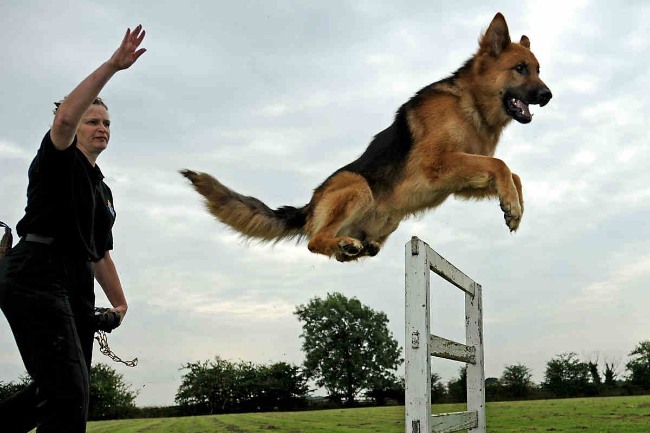Do you want to know how to train a German Shepherd? If so, this is for you. If you’re the proud owner of a German Shepherd puppy, you’re probably eager to start training him right away. This can be a challenging but ultimately rewarding experience.

In this article, we will discuss how to train a German Shepherd puppy in a way that will set him up for success in his adult life. We’ll also provide some tips on how to handle common behavior problems that may arise during training. Let’s get started!
When Should I Start Training a German Shepherd?
The best time to start training a German Shepherd is as soon as you bring him home. Puppies learn best between the ages of eight and 16 weeks old, so this is the ideal window for starting basic obedience training. Of course, you can begin teaching your puppy simple commands at any age – it’s never too late to start!
How Long Does Training a GSD Take?
The length of time it takes to train a German Shepherd will vary depending on the individual dog and how quickly he learns. Some dogs may pick up commands quickly, while others may need more patience and repetition. In general, you can expect training to take several weeks or even months.
What Commands Should I Teach My German Shepherd?
There are a few basic commands that every German Shepherd should know, including sit, stay, come, down, and heel. Once your dog has mastered these basics, you can move on to more advanced commands like fetch or rollover. You can also teach your dog tricks like playing dead or shaking hands. Along with this, also know Can German Shepherd eat banana.
How To Train a German Shepherd?
If you want to learn how to train a German Shepherd, there are a few things you have to consider. Your puppy’s age, how much time you’re willing to invest, and what commands you want your dog to learn will all play a role in how successful training is.
For 8 to 16 Weeks
If you want to know about training a German Shepherd puppy that’s between eight and 16 weeks old, you’re in the ideal window for training. Puppies learn best during this time, so it’s the perfect age to start teaching basic commands. You need to start the crate training and socialization training as well.

You’ll need to be patient and consistent when training your puppy. Remember that puppies have short attention spans, so keeping sessions short – around five minutes is ideal. End each session on a positive note, even if your puppy doesn’t seem to be getting the hang of things right away. With time and patience, he’ll learn!
For 3 to 9 Months
If you have an older German Shepherd that’s between three and nine months old, he may already know some basic commands. If not, don’t worry – it’s never too late to start training! At this age, your dog will probably be able to focus for longer periods of time than a young puppy.
This means you can extend training sessions to around ten minutes. You should still keep things positive, though, and end each session on a good note. Older German Shepherds may also need a bit more repetition than younger dogs when learning new commands. Be patient and consistent, and your dog will eventually get the hang of things!
For Dogs Over 9 Months to 24 Months
If your German Shepherd is over 9 months old, he’s probably already well-versed in the basics. At this point, you can start teaching more advanced commands or tricks.

You may also want to consider enrolling your dog in an obedience class. This can be a great way to socialize your dog and give him some structure. Enrolling in an obedience class is not only great for socialization but also great for building a bond with your dog.
Obedience training is important for all German Shepherds, no matter what their age. By starting early and being consistent, you can set your dog up for success! If you have a dog that is not growing up properly, then see this detailed article on why is my German Shepherd so small.
German Shepherd Training Tips
Here are a few general tips to keep in mind when you want to train a German Shepherd:
- Be patient and consistent. Dogs learn best when they’re given time to process new information.
- Keep training sessions short and sweet. German Shepherds have a limited attention span, so longer sessions will only frustrate them.
- End on a positive note. Praise your dog for a job well done, even if he didn’t get everything perfect.
- Get help from a professional. If you’re having trouble training your German Shepherd, consider enlisting the help of a professional trainer.
- Give them treats. This is another positive reinforcement kind of training. Use lots of your dog’s favorite treats so that the training session becomes joyful and tasty for your dog.
Conclusion
With these tips in mind, you’ll be well on your way to train a German Shepherd! Just remember to be patient and have fun – training should be a bonding experience for you and your dog. Happy training! If you have any doubts related to training your GSD, feel free to contact our German Shepherds website.

